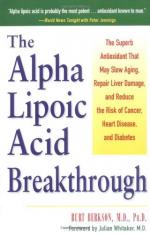|
This section contains 501 words (approx. 2 pages at 300 words per page) |

|
Antioxidants are chemical compounds that combat oxidants or oxidizing agents. In the chemical reaction known as oxidation, one reactant loses an electron while the other gains an electron. The reactant that loses an electron is called an oxidant, or free radical." Oxygen in unstable form is the most common free radical in living cells, where hydrogen peroxide has an exposed oxygen atom with a missing electron in its outer orbital. In addition, oxygen can separate from hydrogen peroxide and form an unbonded single oxygen that is extremely reactive. Contaminants in the environment, as well as the normal metabolism of a cell, can change a cellular molecule into a free radical. In that case, the molecule loses an electron in its outer shell, and becomes an unstable reactor in the cell. The free radical aggressively steals an electron from a stable molecule nearby, and the new molecule then becomes...
|
This section contains 501 words (approx. 2 pages at 300 words per page) |

|


